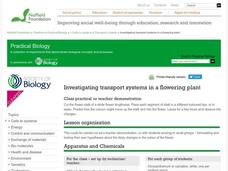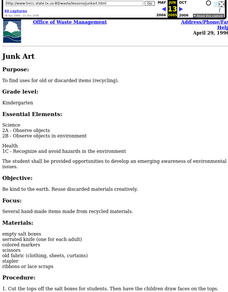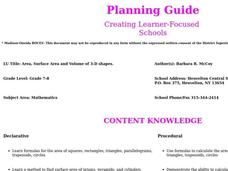Chicago Botanic Garden
Are You Bigfoot?
Scholars independently explore several websites to calculate their ecological footprint. Using their new found knowledge, they answer six short-answer questions and take part in a grand conversation with their peers about how our...
Chicago Botanic Garden
Greenhouse Gas Emissions – Natural and Human Causes
Part three in the series of seven has pupils discussing the different greenhouses gases, learning about the carbon cycle, and then watching a short video about the carbon cycle. Based on their knowledge, individuals complete a greenhouse...
Chicago Botanic Garden
Introducing Ecosystem Services
Purifying air and water, providing soil in which to grow crops, and moving water through its natural cycle are all services an ecosystem provides that benefit humans. Lesson four in a series lets learners explore and discuss the value of...
Chicago Botanic Garden
Personal Choices and the Planet
The last activity in the series of four has individuals determine steps they can take to reduce their carbon footprints and then analyze their schools' recycling programs. Through a sustainability audit, they identify how and where their...
Chicago Botanic Garden
Calculating Your Carbon Footprint
Unplugging from technology for one day per week will decrease your carbon footprint—are you up to the challenge? Part two in a series of three allows individuals to explore their personal carbon footprints. By first taking a quiz at home...
Chicago Botanic Garden
Personal Choices and the Planet
How big is your footprint? Activity three culminates the series by having groups complete carbon footprint audits with people in their schools and/or around the districts. Groups then gather their data, create a presentation including...
Chicago Botanic Garden
Faces of Climate Change
You know global warming is real when your squirrel feeder is full of popped corn instead of kernels! Activity two in a series of five allows learners to explore climate change through the eyes of another. After briefly analyzing their...
Chicago Botanic Garden
Calculating Your Ecological Footprint
You can lower your ecological footprint by recycling! Lesson four in this series of five has individuals, through the use of a computer, calculate their ecological footprints. Through discussions and analysis they determine how many...
Chicago Botanic Garden
Introducing Ecosystem Services
Ecosystems provide many things humans not only use but also need in order to survive. The last instructional activity in the series of seven introduces scholars to the idea of ecosystem services, that ecosystems provide humans with many...
Nuffield Foundation
Investigating Transport Systems in a Flowering Plant
Some weddings have flowers in a unique, unnatural color to match the theme. Young scientists take part in this process to learn about the function of the xylem as they observe colored water moving through a flower. Then, they experiment...
Curated OER
Where Should It Go? Recycle? Compost? Incinerate? Landfill?
Students discuss what happens to trash after it is collected. They sort "clean" trash into groups depending on whether it should be recycled, incinerated, placed in a landfill, composted or if it is something we could avoid using.
Curated OER
Natural Gardening
Students study the effect of pesticides on plants and insects. In this gardening lesson, students discuss the importance of insects. They define pesticides, evaluate their effectiveness and the problems they might cause. Students...
Curated OER
Determination of Water Hardness
Young scholars investigate water hardness. In this water hardness lesson plan, students determine the water hardness in 4 samples of water after buffering each. By using titration and an indicator, young scholars can determine the amount...
Curated OER
Leach Out and Touch Someone
Students discuss how groundwater becomes polluted. In groups, they design and create models of groundwater pollution sources. They demonstrate to the class how the water may become contaminated from local and nonlocal pollution sources.
Curated OER
Area, Surface Area and Volume of 3-D Shapes
Math whizzes examine the relationship between area and volume and the relationship between a 3-D shape and its surface area. Following discussion and practice, pupils participate in a project in which they design packaging for a new...
Curated OER
Energetic Energy: A Child?s Guide to Responsible Energy Use
Students explore how energy transforms into heat. In this energy instructional activity students create models and find a need for fuel to make a Stirling engine.
Curated OER
Organic and Inorganic Recycling
Young scholars examine their role in polluting the environment and discuss the importance of recycling. In groups, they place earthworms into compost piles to observe why they are considered natural recyclers. They also practice...
Curated OER
What the Community Can Do
Students examine how the EPA encourages communities near Superfund sites to become involved in the Superfund process. They read informational text, and participate in a role-play activity.
Curated OER
Toxics Lesson Plan
Students discover that chemicals and toxics are all around us and we can make a choice whether or not to use them.
Curated OER
Mapping the Village
Students measure, weigh, and document the amount of trash and garbage generated by the school for one day. They brainstorm solutions for trash in the area and assist with the school-wide recycle program.
Curated OER
TE Activity: Build an Anemometer
Students determine what an anemometer is and how it measures wind speed. They decide on a place to put a wind turbine by using an anemometer. They examine the role that engineers play when using wind speed to determine a place for wind...
Curated OER
TESI 04 Lesson Plan
Learners write and balance five chemcial equations which have been observed throughout the process of completing the experiment. They use vacuum filtration to recover suspeneded particals from a colloidal suspension. Students correctly...
Curated OER
Acids and Bases: Together again!
Young scholars identify principles behind acid-base reactions. They predict factors that may affect an acid-base reaction. Students identify questions and concepts that guide scientific investigations.
Other popular searches
- Toxic and Hazardous Waste
- Hazardous Waste Disposal
- Hazardous Waste Landfill
- Disposal of Hazardous Waste
- Hazardous Waste Spill
- Hazardous Waste Sites
- Hazardous Waste Cleanup
- Household Hazardous Waste
- Hazardous Waste Rubrics
- Hazardous Waste and Graphing
- Hazardous Waste Materials
- Hazardous Waste Word Scramble

























